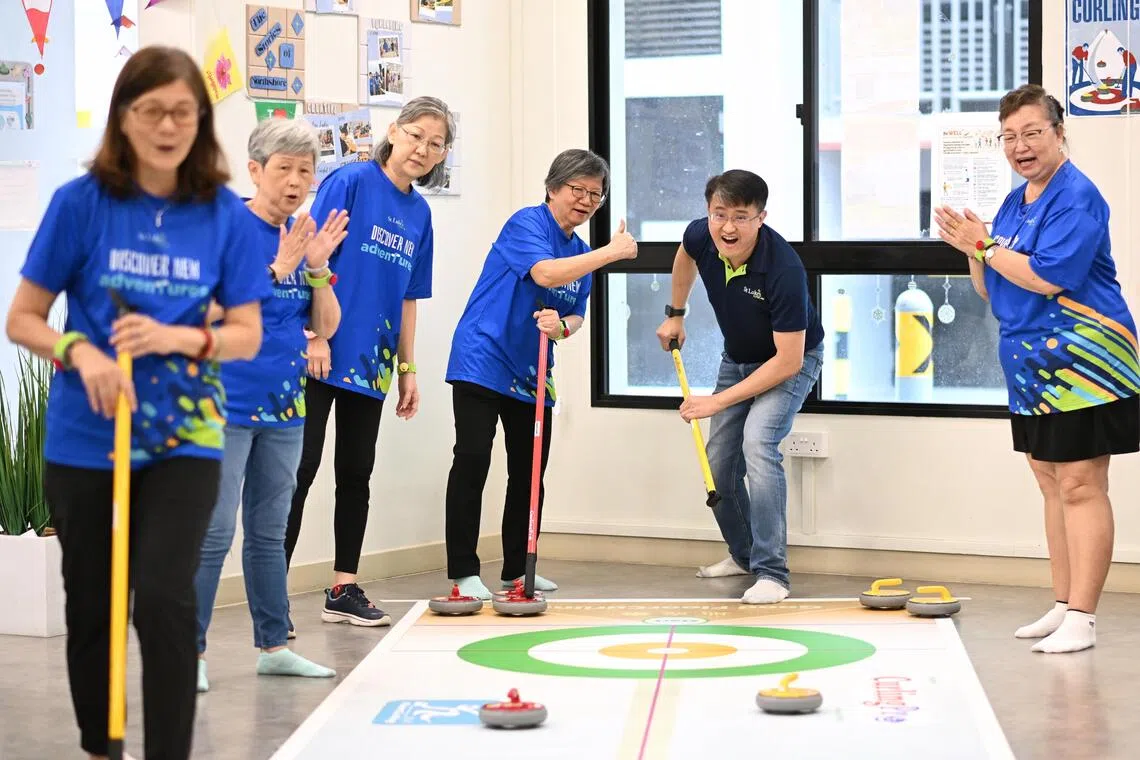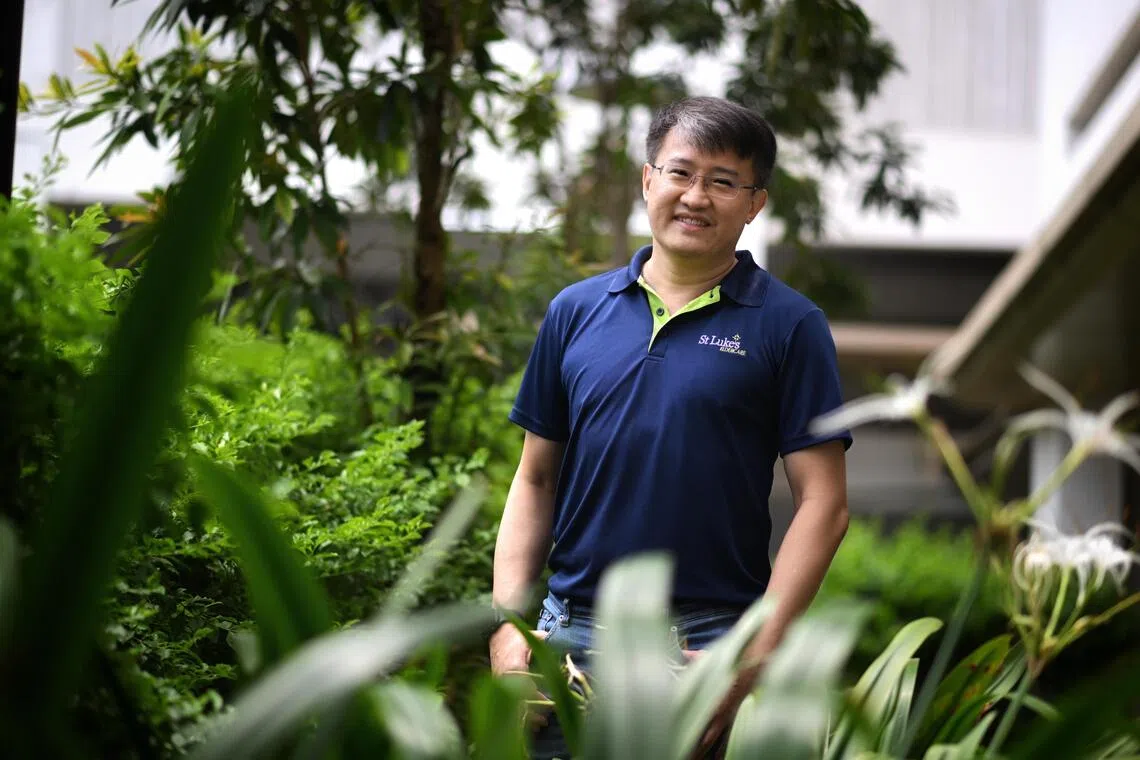Community partnerships drive St Luke’s ElderCare’s efforts to transform care for seniors
Sign up now: Get ST's newsletters delivered to your inbox

St Luke’s ElderCare CEO Kenny Tan joining seniors for a game of curling at SLEC's Active Ageing Centre (Care) at Northshore on Sept 12.
ST PHOTO: CHONG JUN LIANG
- Temasek Polytechnic will have a new senior care centre by 2026 in collaboration with St Luke's ElderCare (SLEC), offering students hands-on community care experience.
- SLEC expands its services and partnerships, aiming to create integrated eldercare, reaching 22,000 elders in 2025 and projecting 45,000 by 2030.
- SLEC invests in "high-tech and high touch" solutions, like VR and AI, for reminiscence therapy, while also focusing on education and training for eldercare staff.
AI generated
SINGAPORE - A new senior care centre to be built in Temasek Polytechnic in 2026 will give students the experience of what community care is like, through hands-on training, internships and learning journeys.
They will also contribute to the centre’s programmes, which may include technology-enabled cognitive games and virtual reality experiences.
The centre, a collaboration between St Luke’s ElderCare (SLEC) and TP, is the first within an academic institution and reflects the emphasis that SLEC chief executive officer Kenny Tan places on partnership as he works to bring his vision of eldercare to life.
Dr Tan, 51, who joined the eldercare sector over 15 years ago, believes the future of eldercare should involve the whole society, and that partnerships can amplify impact.
Since he became SLEC’s CEO in 2016, he has overseen several new partnerships with different community partners to offer their services together. This creates seamless care for seniors, who can access multiple services all in one place, he said.
In the last decade, SLEC has expanded from 12 centres in 2015 to 30 senior care, day rehabilitation and active ageing centres in 2025, as well as two nursing homes. The elders it serves grew from 220 in 1999 to 22,000 in 2025, and is projected to increase to 45,000 by 2030.
For his work in advancing community care in Singapore, Dr Tan is the first recipient of the inaugural Platinum Leadership Award, which he will receive at the Community Care Manpower Development and Excellence Awards ceremony organised by the Agency for Integrated Care (AIC) on Sept 24.
Speaking at an exclusive interview with The Straits Times at SLEC’s Active Ageing Centre (Care) at Northshore on Sept 12, Dr Tan said: “We hope to be that catalyst, an aggregator... for willing partners to come together. We look at what assets are on the ground as we don’t believe in needing to recreate things. We see how we can collaborate and synergise.”

Since becoming St Luke’s ElderCare CEO, Dr Kenny Tan has overseen several new partnerships with different community partners.
ST PHOTO: CHONG JUN LIANG
The new centre at TP will offer day care and rehabilitation services, and is expected to serve more than 80 seniors daily.
“The students have a live space for practice, and the lecturers can do some work with us. We can also involve other faculties for interdisciplinary synergy, and if the childcare centre next door is keen, we can also work with them,” added Dr Tan.
Mr Tan Chee Wee, AIC’s chief executive, said the award honours leaders who are transforming community care and setting new standards of excellence.
“Dr Kenny Tan’s leadership and commitment to the care of our seniors have contributed significantly to the advancement of our community care sector,” he told ST. “AIC looks forward to recognising more leaders like Dr Tan and, in doing so, inspire a new generation of leaders to shape the future of our sector.”
Singapore’s community care sector has been rapidly expanding as the country is set to attain “super-aged” status in 2026. One in four citizens will be aged 65 or older by 2030.
As SLEC works to widen its network to meet the growing demand, it is continually trying to find new partners to work with.
SLEC and Reach Community Services opened an Active Ageing Centre (Care) at Teck Whye Vista in 2024. The three-in-one centre is the first of its kind in the sector, offering day care, day rehabilitation and active ageing services under one roof.
SLEC will also partner New Life Community Services to run an integrated facility housing both an Active Ageing Centre (Care) and a nursing home in Bukit Panjang – Jelapang, to be completed in 2026.
On Nov 15, SLEC will launch its first arts conference with the Nanyang Academy of Fine Arts to share best practices in empowering elders through art.
High tech, high touch
Besides partnerships, the community care sector, which is traditionally low tech and high touch, should aim to be “high tech and high touch”, said Dr Tan. SLEC has invested $1.5 million into advanced robotics for community-based rehabilitation.
Its Golden Memories programme, a form of reminiscence therapy, uses an app powered by generative artificial intelligence to help elders author their own life stories.
Virtual reality is used to power the SLEC Virtual World, another reminiscence therapy programme that allows elders to travel virtually.
“Tech is just an adjunct. It can enable and enhance, but cannot replace human interaction,” said Dr Tan. “Tech is not just about manpower augmentation either, but also motivating the elders.”
For example, when the seniors walk on a technologically advanced treadmill during a rehabilitation programme, they can engage with a screen that simulates an obstacle course.
Instead of activities to simply pass time, senior-centric care must help the elders find higher purpose and meaning in life, he said.
Training for the future
As the sector’s client pool grows, so do its manpower demands. Dr Tan believes in education and training to grow the sector’s talent pipeline – he himself is pursuing a doctorate in innovative urban leadership at Bakke Graduate University, a private institution headquartered in Texas.
He mooted a training academy in 2018, which has since trained over 5,000 healthcare professionals, caregivers and volunteers. It will expand its course offerings by 45 per cent to 42 programmes, and move into a larger space from its current site at the Singapore Institute of Management in Clementi to the Devan Nair Institute for Employment and Employability in Jurong East in 2026.
Dr Tan also teaches as an adjunct lecturer for the Master of Science in Applied Gerontology programme in the Lee Kong Chian School of Medicine at Nanyang Technological University. He is also an adjunct associate professor in the Health and Social Sciences Cluster at the Singapore Institute of Technology.
He formerly had training in obstetrics and gynaecology, but shifted to eldercare after surviving acute epiglottitis – swelling of the flap that shields the windpipe during swallowing – at age 30. The brush with mortality drove him to live fully in the present and serve the elderly, a calling rooted in his deep bond with his grandparents who raised him.
“We are attracting younger staff, and this shift is due to increased awareness and better career trajectory,” he said. “Younger people are more sensitised and drawn to social causes like active ageing, and this spells hope for the future of eldercare.”



